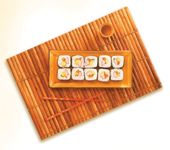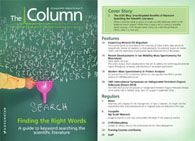My Sushi Moment
Incognito attends a sushi class and ponders the plight of the analytical scientist.
Incognito attends a sushi class and ponders the plight of the analytical scientist.
Recently while on summer vacation I found myself taking a class on sushi making — something I'd wanted to do for several years. The class was excellent and the chef/instructor was a very amiable young man who was keen on talking about the "chemistry" of the sushi-making process — the "pickling and fermentation" of the rice, the release of starch as you patted the rice down on the Nori paper that helped to bind the rolls etc.

Photo Credit: Skip ODonnell/Getty Images
As we were working away, I couldn't help but notice that among some very ornate and brightly coloured tattoos which the chef sported on his forearms, there was a tattoo of what I thought I recognized as styrene. My first thought was that my new chef acquaintance had been misled and that an internet trawl for interesting sushi-based chemicals had gone badly wrong, and he would be forever doomed to be tagged with a popular monomer rather than something much more pertinent, romantic, or even illegal...one never knows!
My curiosity eventually got the better of me and in a quiet moment at the end of the class I asked the chef the relevance of his tattoo. He went on to reveal further molecules on his arms, which I've drawn out in the following figure.
There's a prize for anyone who can guess the relevance of these molecules at this stage, without reading further ahead.

Well, from left to right in the figure the molecules are acrylonitrile, 1,3-butadiene, and styrene. When polymerized they form the very common thermoplastic terpolymer, acrylonitrile butadiene styrene, more popularly known as ABS. So chef, it turns out, knew more than just a smattering of chemistry and thankfully was not labouring under a misapprehension about his indelible markings.
But why ABS? Well, it turns out that brightly coloured tattoo inks are made, at least in part, from ABS, which makes the colours extremely vivid and certainly explained the very brightly coloured fish and other tattoos that the chef was also sporting. He had though it pertinent to pay homage to the chemistry behind his skin art.
But let's get to the point of this instalment.
It turns out that the chef was a highly enthusiastic analytical chemist, who had spent some considerable time working in laboratories during his undergraduate programme and had initially taken a job as a trainee sushi chef to help fund himself through college. Indeed, he had graduated, undertaken a Master's degree, and had begun to work in a laboratory (a subsidiary of a multi-national corporation) that I had visited several years ago, and which was undertaking, at that time, some good research using reasonably advanced techniques. That's where the good news ended.
It turns out that my chef friend and many of his classmates were highly disillusioned with analytical science and while he obviously had a love and passion for the subject, he earned about 30% more as a sushi chef. His benefits package was also much better working for the sushi chain.
Furthermore, he went on to describe how his cohort, with whom he spoke regularly, all felt like second- or third-class citizens behind the chemical engineers, organic chemists, and biochemists with whom they worked. There was a common attitude that the analytical guys were there to simply turn the handle and generate data, which the "higher ups" would then interpret and contextualize to produce "information" useful to the business.
The final straw for chef was the quality of the food in the subsidized staff restaurant! His free sushi was too much of a draw and he left analytical science after around a year in the laboratory.
Ok — this was a young guy (and some of his friends) with only a very small amount of relevant experience, but does any of this resonate with you? Have you ever felt like a second-class citizen, employed to churn out mountains of data, which a superior being will then turn into something useful for your business?
I have to say that at times, and in certain jobs within chemical analysis, I have felt like that. It is at these very times that I have taken it upon myself not to turn to sculpting rice and fish into a tasty dinner, but to learn absolutely everything I could about the way in which my data is produced and its relevance to my internal or external customers; to make sure that the results are fit-for-purpose and will result in the insight required to take the project forward, or not, as the case may be. In short, to care enough to go the extra mile. Now this takes time, often personal time, and a good deal of what employers these days call "discretionary effort" and I can in no way guarantee that it will improve your benefits package to something more than a sushi chef might expect. However, if you really do have a love for analytical science, in your next "sushi moment" instead of looking for a way out, how about looking for a way further in? It might just make life in the lab a little more appealing than life at the fish slab.
A selection of futomaki rolls please...
Contact author: Incognito
E-mail: admin@chromatographyonline.com
This article is from The Column. The full issue can be found here:http://images2.advanstar.com/PixelMags/lctc/digitaledition/August22-2014-uk.html

A Final Word from Incognito—The Past, Present, and Future of Chromatography
February 10th 2022After 14 years in print, Incognito’s last article takes a look at what has changed over a career in chromatography, but it predominantly focuses on what the future might hold in terms of theory, technology, and working practices.
Sweating the Small Stuff—Are You Sure You Are Using Your Pipette Properly?
October 7th 2021Most analytical chemists believe their pipetting technique is infallible, but few of us are actually following all of the recommendations within the relevant guidance. Incognito investigates good pipetting practice and busts some of the urban myths behind what is probably the most widely used analytical tool.



